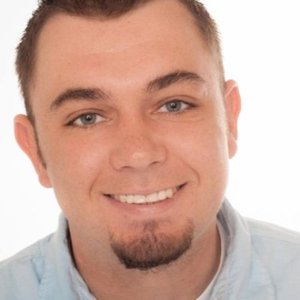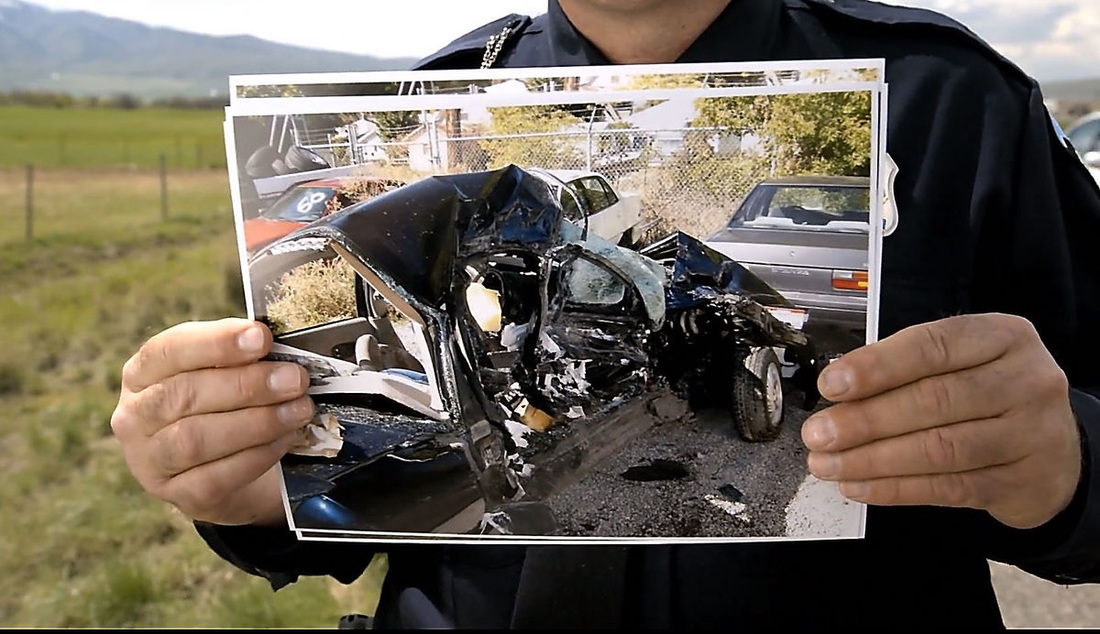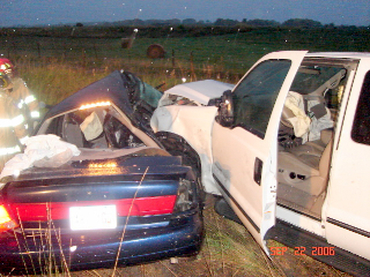Reggie ShawOn Sept. 22, 2006, Reggie Shaw, 19, climbed into his sport utility vehicle to head to a painting job.v It was 6:30 in the morning, and freezing rain was falling. Just behind Reggie was John Kaiserman, a farrier, who was driving a truck and trailer carrying a thousand pounds of horseshoes and equipment.
Reggie came over a big crest and headed down a hill, traveling around 55 miles an hour as he hit a flat stretch. He crossed the yellow divider again. This time, he clipped a Saturn heading the other direction on the two-lane highway. Inside the Saturn were two men, Jim Furfaro and Keith O’Dell, commuting to work. The Saturn spun out of control and across the road, behind Reggie, was hit broadside by the farrier. The Saturn slammed into a gully, and Mr. Furfaro and Mr. O’Dell were killed. |
What was the message you were texting when you collided with the other vehicle? Who was it to? What made you feel that it was that important to respond to the message right then?
I honestly do not know what the exact message was that I was texting when the accident happened, that’s how irrelevant it ultimately was to me and my life that I can’t even tell you what it said.
I do know that I was texting a girl named Brianna that I was dating at the time.
When I was 19 I texted and drove almost every time I got behind the wheel of a car, I thought I was invincible and I would never hurt myself or anyone else. One of the main reasons was because I always wanted to stay in touch with my friends and I didn’t want to miss out on anything.
How did you feel when you found out that two people were killed because of your actions? When did you find out that the two people passed away?
I remember at the scene I found out that the man driving (James Furfaro) was killed, but at the scene I thought that there was only one man in the car. I went into shock and refused to believe that this had just happened. The car that these two men were in was smashed to the point that you could not tell initially that there was someone in the passenger seat. I found out the next morning that Keith O’dell was in the passenger seat and that he was also killed. It was devastating, I went into severe depression, and I didn’t sleep for days.
What was your sentence or punishment for committing this action? Did you feel that your punishment fit the offense?
I agreed to a plea deal that was structured by the state and the families of these 2 men. The plea was that I would serve 30 days in jail, and do 200 hours of community service which was all to be done speaking to youth groups about distracted driving.
I struggle with my decision every day, there is not a day that goes by that I don’t wish I could go back and change what I did. I don’t know if 30 days in jail was or was not enough time for me and the pain that I caused for so many people, but I do know that I will dedicate my life to making sure that others don’t have to suffer like they do everyday.
Did you have an opportunity to speak with the family members of the two men that were killed? If yes, what were those conversations like? Has the family of the victims forgiven you?
I have gotten the opportunity to speak with most of the family members and I am extremely grateful for the forgiveness and the mercy that has been shown towards me. The first family member I met was Megan O’dell (Keith’s daughter). We met in a small room with the victims advocate who had been working our case. The first thing Megan said to me was that she knew her father was the first one to forgive me, and that it was time she forgave me. We cried and have been really good friends ever since.
Has your own family forgiven you for your actions? How did this situation change your relationships with the people close to you?
My family has been great and has been very supportive of me.
I did lose a lot of relationships in my life though in the months after the accident and it wasn’t because people changed it was because I changed. When I was going through my depression I shut everyone around me out, and the more people tried to help me the more I would distance myself from them. People wanted to help me and support me but I choose not to allow it, and the relationships grew further and further apart.
What have you done since the accident to help promote safe driving and change people's perspective on texting and driving? What opportunities have you had to publicly encourage attentive driving?
I have done everything that I can to try and prevent other accidents like mine from happening. I have spoken over 350 times in 7 years. Some of those include the Oprah Show, events for the NBA, events for the National Departments of Transportation. I have also been a part of many campaigns to end distracted driving including ATT’s “It Can Wait” campaign. I try to take advantage of every opportunity to educate others on the dangers of distracted driving, nobody has to put people through what I put people through.
What thoughts or ideas do you think would be effective in promoting attentiveness while driving? How can I get the message across to students to stop driving while being distracted?
There are a lot of apps out there to help prevent people from using their phone when they drive and that is a good place to start. For me the solution is much simpler, turn the phone off when you drive.
To get the message across everyone must understand that this can happen to anyone, if you use your phone when you drive it is not a matter of “if” you will hurt someone it is a matter of “when”.
I honestly do not know what the exact message was that I was texting when the accident happened, that’s how irrelevant it ultimately was to me and my life that I can’t even tell you what it said.
I do know that I was texting a girl named Brianna that I was dating at the time.
When I was 19 I texted and drove almost every time I got behind the wheel of a car, I thought I was invincible and I would never hurt myself or anyone else. One of the main reasons was because I always wanted to stay in touch with my friends and I didn’t want to miss out on anything.
How did you feel when you found out that two people were killed because of your actions? When did you find out that the two people passed away?
I remember at the scene I found out that the man driving (James Furfaro) was killed, but at the scene I thought that there was only one man in the car. I went into shock and refused to believe that this had just happened. The car that these two men were in was smashed to the point that you could not tell initially that there was someone in the passenger seat. I found out the next morning that Keith O’dell was in the passenger seat and that he was also killed. It was devastating, I went into severe depression, and I didn’t sleep for days.
What was your sentence or punishment for committing this action? Did you feel that your punishment fit the offense?
I agreed to a plea deal that was structured by the state and the families of these 2 men. The plea was that I would serve 30 days in jail, and do 200 hours of community service which was all to be done speaking to youth groups about distracted driving.
I struggle with my decision every day, there is not a day that goes by that I don’t wish I could go back and change what I did. I don’t know if 30 days in jail was or was not enough time for me and the pain that I caused for so many people, but I do know that I will dedicate my life to making sure that others don’t have to suffer like they do everyday.
Did you have an opportunity to speak with the family members of the two men that were killed? If yes, what were those conversations like? Has the family of the victims forgiven you?
I have gotten the opportunity to speak with most of the family members and I am extremely grateful for the forgiveness and the mercy that has been shown towards me. The first family member I met was Megan O’dell (Keith’s daughter). We met in a small room with the victims advocate who had been working our case. The first thing Megan said to me was that she knew her father was the first one to forgive me, and that it was time she forgave me. We cried and have been really good friends ever since.
Has your own family forgiven you for your actions? How did this situation change your relationships with the people close to you?
My family has been great and has been very supportive of me.
I did lose a lot of relationships in my life though in the months after the accident and it wasn’t because people changed it was because I changed. When I was going through my depression I shut everyone around me out, and the more people tried to help me the more I would distance myself from them. People wanted to help me and support me but I choose not to allow it, and the relationships grew further and further apart.
What have you done since the accident to help promote safe driving and change people's perspective on texting and driving? What opportunities have you had to publicly encourage attentive driving?
I have done everything that I can to try and prevent other accidents like mine from happening. I have spoken over 350 times in 7 years. Some of those include the Oprah Show, events for the NBA, events for the National Departments of Transportation. I have also been a part of many campaigns to end distracted driving including ATT’s “It Can Wait” campaign. I try to take advantage of every opportunity to educate others on the dangers of distracted driving, nobody has to put people through what I put people through.
What thoughts or ideas do you think would be effective in promoting attentiveness while driving? How can I get the message across to students to stop driving while being distracted?
There are a lot of apps out there to help prevent people from using their phone when they drive and that is a good place to start. For me the solution is much simpler, turn the phone off when you drive.
To get the message across everyone must understand that this can happen to anyone, if you use your phone when you drive it is not a matter of “if” you will hurt someone it is a matter of “when”.



